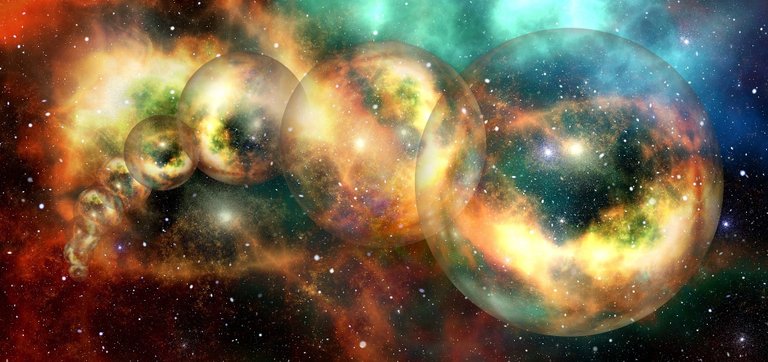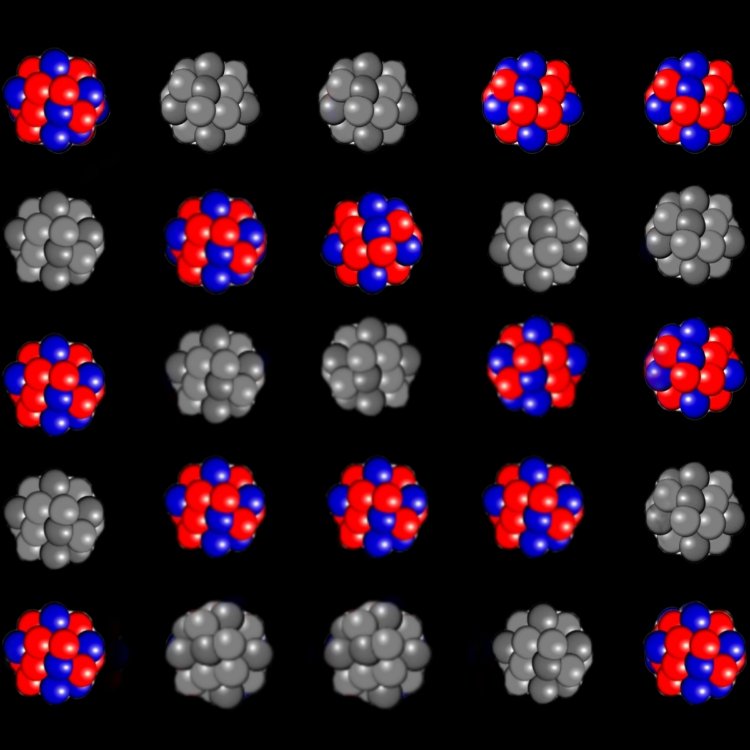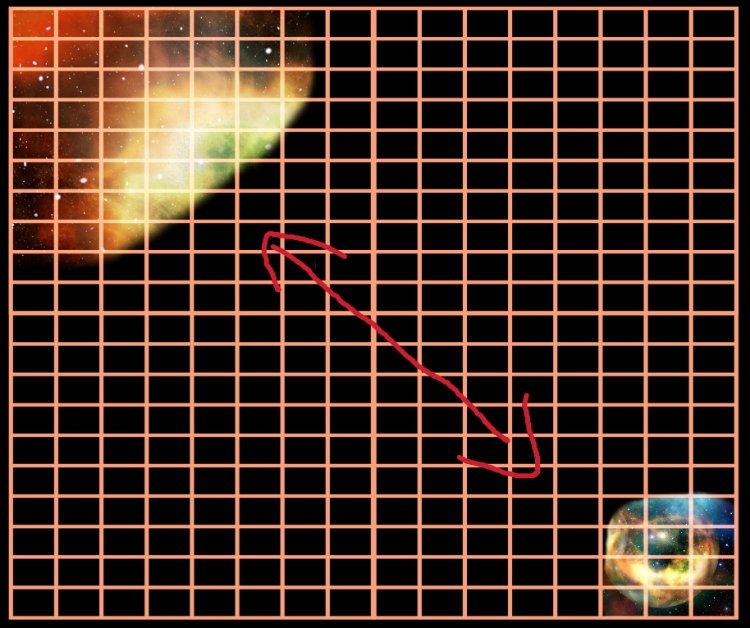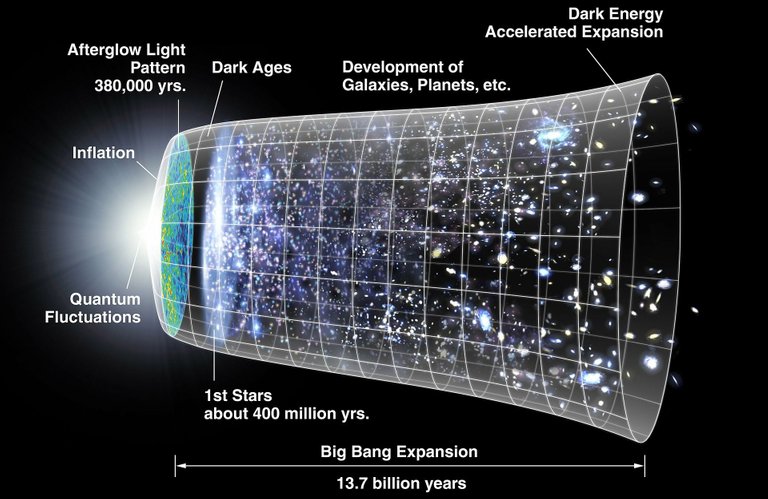Eternal Inflation - The Multiverse Might Be Real!
The description of how our universe evolved from the moment of the Big Bang is known as the Big Bang Model, this model however has some problems. It doesn't tell us for example why the universe is so homogeneous, it looks pretty much the same everywhere. Why does it appear geometrically flat, or why there's no magnetic monopoles.
Cosmic Inflation solves these problems and accounts for much of the structure of the universe we see today.
One implication of this cosmic inflation, however, is that on scales much larger than our observable universe it may not be so homogeneous. This means that inflation ended at different times in different places. [2]
And if that's true, then it means that the universe is far more bigger and way more complex than we realise.

Inflation occurred due to our universe having lots of energy in the form of a scalar field (the inflation field). This field caused an enormous expansion in the universe, though only for a miniscule split of a second as the universe quickly decayed into other fields and particles.
After this initial expansion, the universe kept on expanding, but at a much slower rate. Using some equations of physics and knowing what the total energy that this field would need to have, it can be calculated based on the total energy of our current universe, and we can approximate how long this inflation should last.[2]
Most models showed that it would last for a minuscule amount of time (10-32 - 10-36 seconds). The key point about these calculations about how long inflation should last, however, is that it tells us only how long it should last on average.
Quantum mechanics, ensures there will always be some randomness. In other words, the inflation field will have randomness, and inflation could last a bit longer or shorter in different parts of the universe.

Let's take radioactive decay for an analogy,
An isotope of Thorium for instance is Thorium231, its half-life is about one day.[5]
This means, if you have say 1kg of Thorium231, after one day, half of that amount would have decayed into Protactinium231 for example, so you would be left with half a kilogram. Then the following day, half of what is remaining (1/2 kg) would decay, and so on until you don't have any Thorium231 left.

It means if you start with a hundred atoms of Thorium231, then after one day 50 of them would have decayed and 50 would remain as Thorium231. But the nature of quantum mechanics is that we can't predict in advance which of those 100 atoms will decay and which will not decay on any given day.
So if you pick 1 atom at random and wait for it to decay, it might decay on the first day, the second day, the third, or later. There's no telling. All that we can know is that if we have a large number of atoms about half will decay every 24 hours or so but we don't know which ones.

Inflation might work in a similar way:
In the 1980s, Paul Steinhardt, and Alexander Vilenkin, realised that the exponential expansion of cosmic inflation, although it stopped in our part of the universe, could continue without it in other unobservable parts of the universe.
Like the concept of half-life, quantum uncertainty may cause on average half the volume of the expanded universe to stop inflating after about 10-32 seconds. But it could continue in the other half of the universe.
Multiple universes can form:

Steinhardt and others realised that if the decay of the inflation field happens slower than the rate of expansion of the universe, then inflation could go on in principle forever. Creating more and more bubble universes.
A big difference in the analogy between radioactive decay and inflation is that, in radioactive decay since we have a limited amount of material with no new material being created with the passing of every half-life, eventually all the material decays over time. But in an eternal inflation, since new space is being created all the time, inflation never stops! Hence, it's called Eternal Inflation.
For all practical purposes, each of these parts where inflation stopped, it looks like a separate universe, or a bubble. And it's independent of what happens in these other parts of the universe.
Space expands so much between them faster than the speed of light, no information can travel between the bubbles, no matter how long we wait. And they will never collide. They are informationally completely isolated from each other.[3]
If the theory of eternal inflation is correct, then we are inside one of these bubbles. And it's highly unlikely that we are in the first bubble or even the first few bubbles. Considering the vast number of bubbles being created every instant, we could be in any one of them.

Standard theory vs eternal inflation theory:

Our most accepted standard theory of the bigbang says that about 13.8b years ago the Big Bang happened, we don't know what caused it or what took place before this event. But about 10-36 seconds later, cosmic inflation happened, causing the universe to expand exponentially before it ended. Then the universe continued to expand at a much slower pace, and these events largely explain what we observe in the universe today.[1]
With eternal inflation the story changes a bit, we don't know what happened but a fraction of a second later inflation happened, could have happened arbitrarily far in the past, and it's may also be possible that there may not have been a beginning at all. Many bubble universes formed and are continuing to form, and at some point within this space our bubble formed. Probably not the first, and certainly not the last. Inflation will continue forever, sprouting continually new bubbles of universes in the space that is created within it.[3]
What we observe in our bubble, 13.8b years after its formation can be explained by the Big Bang model.
So what we think was the beginning of the universe was instead where exponential inflation simply ended in our part of the universe.
But the universe itself on a much larger scale is an unimaginably vast multiverse of universes.
Those other universes might be like ours or they might not. But it probably is a good bet to think that the fundamental laws of quantum mechanics would still apply, since inflation itself is derived from quantum mechanics. And there might probably be some overarching overall laws of nature that can describe the entirety of the multiverse, describing how the field expands and how those bubbles form. But there's nothing that prevents those bubbles from having different laws of physics than ours or different constants than ours. (You can read my article about fundamental constants in our universe here)

That said, proving such multiverses and bubble universes is no easy task. As no information can travel between them, so unless we can create a wormhole (which is unlikely) between such bubbles, we can't know whether they actually exist.
However, the key to understanding the early universe lies in the study of high energy physics. If we can replicate energies and temperatures close to the Big Bang, it might give us a clue whether eternal inflation could be correct. And currently, our state of the art facility, The Large Hadron Collider can come nowhere close to those energies of the bigbang. (About 1013 eV at the LHC vs 1024 eV at the big bang) But perhaps future generations of colliders can get us closer.
And also currently, our instruments aren't sensitive enough to detect background gravitational waves which probably fill up the sky, just like the cosmic microwave radiation does. These gravitational background waves would be remnants of the Big Bang and could hold clues about the potential of whether multiverses exist.
A planned European space agency gravitational waves observatory (eu-LISA) might be able to detect these.

In the past, we thought Earth was the centre of everything then it was shown that it is not, and it revolved around the sun, which then was thought to be the centre, just to be proven that it too was in a galaxy that we thought is the universe back then too.
Later on yet again it became clear that our galaxy wasn't anything special, not a centre, and there are billions of other galaxies and clusters. Likewise, we might find out one day that the Big Bang was not the beginning of everything, it might have been simply our Big Bang, and what we call the universe now could merely be a tiny bubble within a vast ocean of bubbles in a space that is getting exponentially larger with every passing of a fraction of a second.

● Thank you for reading ●
● •
1- Big Bang | 2- Inflation (cosmology) | 3- Eternal Inflation Theory | 4- LHC | 5- Isotopes of Thorium |

© 2022 @yaziris.
In 6th grade, I hypothesized that the universe is a kaleidoscope. Over a decade later, scientists publish a very similar theory. Lol.
!PIZZA !LUV !hivebits
@amyx(1/1) gave you LUV. H-E tools | connect | <><
H-E tools | connect | <><
LUV in the dark? The confirmation-reply may soon be turned off. This would be to conserve and replenish Resource Credits. Even while operating in the dark, your LUV command will still go through as usual. You can always monitor LUV in your wallet, at explorer A or at explorer B, or best, in real time at the luv-log channel on Discord.
Tap to help.
Lol @amyx, you should have kept hypothizing. Or in fact, you should do so now. 😁
Yeah, plenty of lensing going on, it might aswell be.
Thank you for dropping by and for your sweet comment!
!PIZZA !LUV
@yaziris(1/1) gave you LUV. H-E tools | connect | <><
H-E tools | connect | <><
LUV in the dark? The confirmation-reply may soon be turned off. This would be to conserve and replenish Resource Credits. Even while operating in the dark, your LUV command will still go through as usual. You can always monitor LUV in your wallet, at explorer A or at explorer B, or best, in real time at the luv-log channel on Discord.
Tap to help.
PIZZA Holders sent $PIZZA tips in this post's comments:
pravesh0 tipped yaziris (x1)
@yaziris(1/5) tipped @pravesh0 (x1)
queenstarr tipped yaziris (x1)
amyx tipped yaziris (x1)
yaziris tipped amyx (x1)
yaziris tipped queenstarr (x1)
Learn more at https://hive.pizza.
A real mind puzzle which I found informative.
😜I enjoyed Reading
!PIZZA
Glad you found it informative, and that you enjoyed reading.
Thanks for stopping by, it has been a while... 😜
!PIZZA back.
😜
Thanks for your contribution to the STEMsocial community. Feel free to join us on discord to get to know the rest of us!
Please consider delegating to the @stemsocial account (85% of the curation rewards are returned).
You may also include @stemsocial as a beneficiary of the rewards of this post to get a stronger support.
Oops, sorry @stemsocial. Apparently I forgot to add the beneficiary to support the community in this post. Thank you for your support regardless. <3
One interesting fact with the Big Bang model is that in the very first moment of the universe, it was small enough so that quantum effects should be present. It was in addition so massive that general relativity should apply too. And here is the catch: we have no idea how to model this theoretically. Therefore, the first fractions of second of the life of our universe consists of a blurry period in which we don't really know what happened. In particular, this challenges even a definition of an origin of all times.
Consequently, everything is open to imagination :)
PS: thanks for this interesting blog :)
I think it's hard to imagine because of our comprehension of opposites.
This might be crazy or stupid idea but. "Philosophically" speaking, I tend to think about it in this way; imagine a Big Freeze, where only 1 sub-atomic "particle" is left at the end. That "energy" is so tiny but yet it would be all that there is, and in the infinite nothingness, it would be everything. Super tiny, super dense, yet super massive as it is everything there is.
Don't ask me what happens next though, we're back at those first fractions of the second. xD
As always, thank you for reading and for your valuable input!
I would rather not call a big freeze a case where a single subatomic particle is left, but more a gigantic universe where every single particle is isolated.
I have the impression that what you have in mind is instead a kind of soup of elementary particles like in the first moments of the universe. This would correspond to a big crunch scenario. In this case, the problems of the first fractions of second are the problems of the last fractions of second too. As there is no more time defined in there, we can think long about them :D
Yes, my bad. I actually was thinking of a soup like state (had bose-einstein condensate like state in mind, hence why I said that energy is so tiny, but yet subconsciously thinking fraction of a Kelvin is beyond freezing. So I typed "big freeze" 😁)
I see. It is indeed what I imagined ;)
Congratulations @yaziris! You have completed the following achievement on the Hive blockchain and have been rewarded with new badge(s):
Your next target is to reach 15000 upvotes.
You can view your badges on your board and compare yourself to others in the Ranking
If you no longer want to receive notifications, reply to this comment with the word
STOPBookmarked for reading. I will need some time to understand. :))
!LUV
!PIZZA
No worries, thanks for stopping by!
!LUV !PIZZA